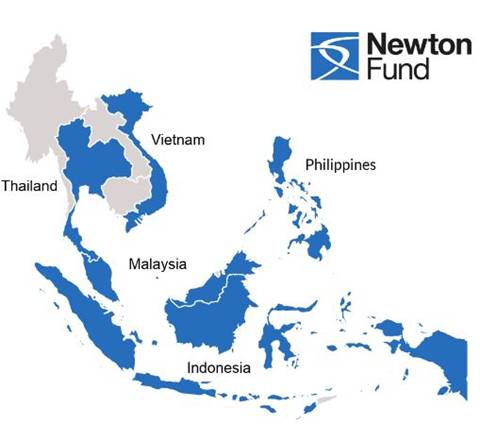26th February 2018
The Newton Fund in Southeast Asia: Looking back, and looking forward
With celebrations of the New Year in the West and Chinese New Year fading, I took a moment to look back at the Newton Fund last year, and where the year ahead is likely to take us.
We closed out 2017 by celebrating the Newton Prize. This Prize is given to recognise the very best of the science supported through the Newton Fund and to help it to move forward further and faster. Six Newton Prizes were awarded globally in 2017, including four in countries I have the pleasure to work with: Thailand, Malaysia and Vietnam. These are prestigious prizes, with the winners selected by an eminent Committee chaired by the President of the Royal Society, Sir Venki Ramakrishnan.
I was able to attend two of the Award ceremonies in Vietnam and Malaysia, presided over by our Ambassador and High Commissioner, with local Ministers and other senior figures attending. The Minister of State for Asia Pacific at the Foreign and Commonwealth Office, Mark Field, did the awarding honours at the ceremony in Bangkok, awarding both the Newton Prize and a Chairman’s Award for Thailand. I enjoyed seeing the anticipation building in the room as the runners up, and then the winners, were announced, and hearing about their groundbreaking work. You can see this too, in our highlight video clips in Vietnam and Malaysia.
Research with impact
The Newton Prize winners’ projects were selected for the impact they are having on people’s lives and the environment, their innovative and excellent science, and their strong collaboration and partnership. The large number of applications received demonstrates the amazing activities in the region. The winning projects are tackling challenges which are faced not only by countries in South East Asia, but all around the world. You can read about the innovative science behind the projects which ranged from communication systems in natural disaster scenarios, improving diagnosis of genetic diseases in children and using waste to produce sustainable energy. The funding from winning the Newton Prize will help take the research to the next stage; we can’t wait to see where this will lead.
The Newton Prize winning projects are just the tip of the iceberg for the Newton Fund in Southeast Asia. Since launching the Newton Fund in 2014, we now have over 100 Newton programmes in five Southeast Asian countries including eight large regional research and innovation programmes. With over 650 million people – or 8.5% of the world’s population – living in Southeast Asia, this region includes some of the world’s fastest growing economies, like the Philippines and Vietnam, with growth rates of 6%. Yet, 1 in 6 people live below the poverty line. The Newton Fund is providing an opportunity for UK scientists to work together with researchers from all five countries to tackle some of the common challenges facing the region.

The range of joint research already taking place is remarkable. From air pollution, water and environmental management, to sustainable rice production (take a look at the researchers in action in the paddy fields) and health issues such as dengue, cancer and HIV. We’re working to help build the skills of researchers to take their ideas out of the lab and into the community, where they can benefit people’s lives and livelihoods.
Looking ahead
It is going to be another busy year ahead. Researchers from the Philippines and Thailand, with counterparts in the UK and China will be investigating animal health – notably swine and poultry disease – and the risks these pose to human health. We can expect announcements later in the year on joint projects across the region to understand the impacts of extreme weather events, such as floods and droughts, so we can increase resilience to future events. The UK’s Met Office has a growing partnership to understand weather and climate patterns to aid decision making. A regional programme with InnovateUK and Nesta will build a global network of senior policymakers to prototype and pilot new innovation projects. Joint work is currently being developed to understand the biodiversity of one of the world’s most diverse regions (the Wallacea region – a huge expanse across eastern Indonesia).
The Newton Prizes in 2017 topped off a year of progress and showed what can be achieved through strong partnerships between research funders and scientists from the UK and South East Asia. These projects draw on the strengths of all of the countries involved. I look forward to more progress in the year ahead!
